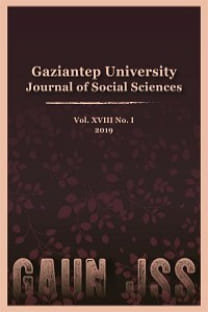Öğretmenlik Uygulamalarındaki İkilem Durumları: Aday Öğretmenler Neler Yansıtıyor?
Öğretme ve öğrenme süreçleri hakkında yeni anlayışların ortaya çıkacağı düşünüldüğü için, öğretmen adaylarının ders kapsamında öğretmenlik uygulaması sürecinde deneyimlediği ikilemler üzerine yansıtıcı düşünmeleri önerilmektedir. Bu çalışmanın çıkış noktası, aday öğretmenlere İngilizce öğretiminde yaşadıkları kendi ikilemlerinin farkına varmalarına ve bunları açıkça ortaya koymalarına yardım edebilmektir. Bu yol izlenerek, aday öğretmenlerin kendi düşünme sistemleri üzerine kuramsal bakış açılı değerlendirmeler yapmaya ve yansıtıcı sorgulamalar yürütmeye yönlendirileceği düşünülmüştür. Nitel yaklaşımı benimseyen bu çalışma, Türkiye’de öğretmenlik uygulaması dersini alan aday öğretmenlerin uygulama okullarında örnek derslerini tamamladıktan hemen sonra öğretim sürecinde yaşadıkları ikilemler üzerine ne düşündüklerini ortaya koymakta ve yorumlamaktadır. Aday öğretmenlerin yaşamış oldukları öğretme süreci ikilemleri, bir dersin üç boyutu olan planlama, yürütme ve yönetme boyutlarında yaşanan ikilemlerdir. Çalışmanın bulguları, bütüncül olarak, aday öğretmenlerin bir öğretme süreci içerisindeki çelişen düşüncelerini, değerlerini veya beklentilerini ve de bu ikilem durumlarında uygulamaya koydukları kararları nelerin yönlendirdiğini içermektedir.
Anahtar Kelimeler:
Öğretme süreci ikilemleri, aday öğretmenler, öğretmenlik uygulaması, İngiliz Dili Öğretimi
Dilemma Situations in Teaching Practice: What Do Student Teachers Reflect?
It has been suggested that if student teachers formally reflect on teaching dilemmas they confront, it may be possible for them to uncover new understandings of the teaching and learning process. The starting point of this study is to help student teachers be aware of their own conflicts in teaching English and talk about them explicitly, which is thought to lead them to make theory-informed evaluation of their ways of thinking and to stimulate the habit of reflective inquiry. Employing the qualitative approach, this paper outlines and interprets how student teachers in a practicum course in Turkey reflected on their teaching dilemmas just after they completed their teaching practice in their practice schools. The dilemmas student teachers reflected on were on three dimensions of a lesson: planning, managing, and conducting the lesson. The interpretations included conflicting thoughts, values, or expectations of student teachers throughout the teaching process as a whole; and the issues that guided them in deciding on their courses of action.
Keywords:
Teaching dilemmas, student teachers, practicum, English language teaching,
___
- Brock, C. H., Case, R. & Taylor, S.S. (2913).Dilemmas in guiding pre-service teachers to explore literacy instruction and diversity. Teacher Education Quarterly, 81-100.
- Cynthia H. Brock, R. C., & Taylor, S.S. (2013). Dilemmas in Guiding Pre-Service Teachers to Explore Literacy Instruction and Diversity. Teacher Education Quarterly. 81 – 100.Çimen, Ş.S. (2017). A case study on pre-service English language teachers’ cognitions and practices regarding most commonly experienced in-class challenges. Unpublished Doctoral Dissertation. Middle East Technical University, Ankara/Turkey. Retrieved 31 July 2019 from: https://tez.yok.gov.tr/UlusalTezMerkezi/tezSorguSonucYeni.jsp
- Donahue, D.M (1999). Service learning for preservice teachers: Ethical dilemmas for practice. Teaching and Teacher Education, 15. 685-695.
- Ehrich, L. C., Kimber, M., Millwater, J., & Cranston, N. (2011). Ethical dilemmas: a model to understand teacher practice. Teachers and Teaching: Theory and Practice, 17(2), pp. 173-185.
- Farrel, T. S. C. (2008). Learning to teach language in the first year: a Singapore case study. In Novice language teachers: Insights and perspectives for the first year (Ed.) Farrel T. S. C. Equinox, 43-56.
- Harvey, S.; Cushion, C. & Sammon, P. (2014). Dilemmas faced by pre-service teachers when learning about and implementing a game-centered approach. European Physical Education Review, 21(2). 238–256
- Helton, G. B., & Ray, B. A. (2006). Strategies school practitioners report they would use to resist pressures to practice unethically. Journal of Applied School Psychology, 22(1), 43-65.
- Komorowska, H. (2016). Dilemmas in language teaching and teacher education. Glotto Didaktica 63(1), 81-95.
- Kremer-Hayon, L. & Tilemma, H. (2002). Practicing what we preach. Teacher Educators’ dilemmas in promoting self-regulated learning: a cross case comparison. Teaching and Teacher Education, 18, 593-607.
- Millwater, J., Ehrich, L.C., & Cranston, N. (2004). Preservice teachers` dilemmas: Ethical or not? International Journal of PEPE Inc, 8(2), 48-58.
- Scager, K., Akkerman, S. F., Pilot, A. & Wubbels, T. (2017). Teacher dilemmas in challenging students in higher education. Teaching in Higher Education, 22:3, 318-335, DOI: 10.1080/13562517.2016.1248392
- Shapiro-Lishchinsky, O. (2011). Teachers’ critical incidents: Ethical dilemmas in teaching practice. Teaching and Teacher Education, 27, 648-656.
- Smagorinsky, P., Wilson, A. A. & Moore, C. (2011). Teaching Grammar and Writing: A Beginning Teacher's Dilemma. English Education, 43(3). 262-292. Published by: National Council of Teachers of English Stable URL: http://www.jstor.org/stable/23017093
- Tilemma, H. & Kremer-Hayon, L. (2005). Facing dilemmas: teacher educators’ ways of constructing a pedagogy of teacher education. Teaching in Higher Education, 10, 203-217.
- Urmston, A. (2003). Learning to teach English in Hong Kong: The opinions of teachers in training. Language and Education. 17(2). 112-137.
- Windschitl, M. (2002). Framing constructivism in practice as the negotiation of dilemmas: An analysis of the conceptual, pedagogical, cultural, and political challenges facing teachers. Review of Educational Research. 72(2): 131–175.
- Zhu, G., Peng, Z., Deng, L., Li, G., & Etchells, M. (2019). Student teachers’ emotions, dilemmas and professional identity formation amid the teaching practicums. Paper presentation at the American Educational Research Association Annual Meeting. Toronto, Canada, April 5-9, 2019.
- ISSN: 1303-0094
- Yayın Aralığı: Yılda 4 Sayı
- Başlangıç: 1991
- Yayıncı: Gaziantep Üniv. Sosyal Bilimler Enst.
Sayıdaki Diğer Makaleler
Ali Smith’in How To Be Both Romanında İkili Anlatı ve Çoğul Bakış Açıları
Öğretmenlik Uygulamalarındaki İkilem Durumları: Aday Öğretmenler Neler Yansıtıyor?
Şeyda Selen ÇİMEN, Şevki KÖMÜR
Hari Kunzru’nun Gölgenin Gölgesi Adlı Eseri ve Taklitçi Oluşum Romanı
Kültürel Ağları ve Hoşnutsuzluklarını Haritalama
Florence Marryat’ın The Blood of the Vampire Romanında Baş Döndürücü Bir Yüzyıl Sonu
‘Başkalarının Ölçülerine’ Karşı: Sidney ve Spenser’da Milliyetçiliği Yeniden Değerlendirmek
“Çok Fazla Gerçeği Taşıyalım:” T. S. Eliot’ın ‘Burnt Norton’ Şiirindeki Yabancı
Cormac McCarthy’nin Yol Romanında Var Olmanın Etiği
Sevim Burak ve Ursula K. Le Guin’in Eserlerinde Evli Kadınların Temsili
